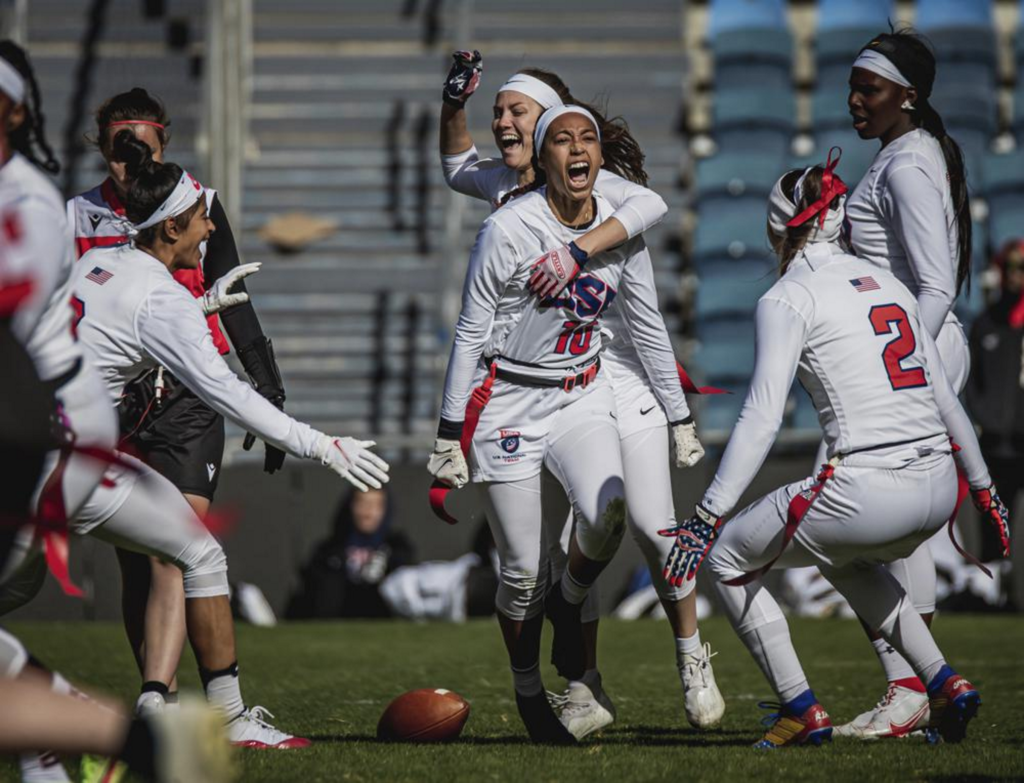By Barry Wilner
The NFL is helping wave the flag for flag football to become part of the Olympics.
The target is the 2028 Summer Games in Los Angeles.
Flag football is one of the faster growing options for the sport, both within this country and worldwide. There currently are 71 nations on five continents that are members of the International Federation of American Football, and the flag version will be among 30 sports on display at the World Games in July in Birmingham, Alabama — a key step in popularizing the game.
“It is important, with the Olympics as an ultimate goal,” says Pierre Trochet, IFAF’s president, “but we also have a task in growing and having a solid competition plan over the next five, six, seven years on every continent.
“The Olympics are the biggest global stage for sports in the world. Flag football can be played by men and women and also be coed, it’s easy to integrate and safe to play.”
Entry onto the Olympic docket is not easy, though. Having the NFL’s power and popularity behind flag football certainly could make the IOC and Los Angeles Games organizers pay heed.
“NFL Flag is among the fastest growing sports in America and around the world for boys and girls, men and women. Under IFAF’s leadership, we share a common interest in increasing opportunities for athletes to play football at all levels and support the work IFAF has done to help grow the sport globally,” says Damani Leech, NFL chief operating officer of international. “We are excited for the debut of flag football in the World Games this summer and remain supportive of IFAF’s work to bring flag football to the Olympic stage, two global events that will inspire the next generation of athletes from around the world.”
Adds Scott Hallenbeck, an IFAF vice president as well as CEO of USA Football, the governing body for the sport in this country:
“The idea that, hopefully, the IFAF and LA 28 and the IOC can say the Olympics is now a destination point would be a massive exclamation point and appeal for growing the sport not only in this country but worldwide.”
Flag football features attributes that resonate with competition formats in events such as the World Games and the Olympics, including gender balance, smaller rosters, short turn-arounds between games, and low cost to play.
Competition to be accepted for the Olympics could be tough, with baseball and softball expected to return after sitting out 2024 in Paris. Lacrosse and cricket are other teams sports interested in LA, and several individual sports are likely to apply.
“There will be different categories that will be competing to get in to the Los Angeles Games,” says Andy Fuller, IFAF’s managing director. “We’ll concentrate on our own path forward; to go too much left or right won’t serve us much value.”
But the World Games this summer could provide great value, and a strong indication how flag football fits on a big, multi-event stage. That event could be an eye opener for viewers and spectators who not only will see a game with high appeal to youngsters, but one with participation potential for pretty much anyone.
“Someone sitting in France and watching `football,′ that is the NFL,” Hallenbeck says. “You see the type of game and physical nature of men in this case, and that is what you understand. All of a sudden we introduce this idea of flag football, and you see `I don’t need to be 6-4, 300 pounds, a 4.2 speedster,′ but can be an everyday human.
“And have the chance to represent my country in the Olympics? A massive opportunity. It appeals to the broadest section of the world.”

